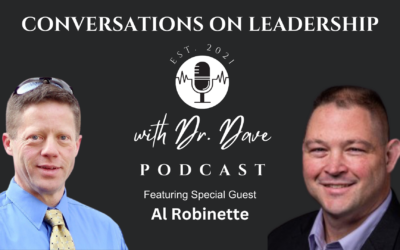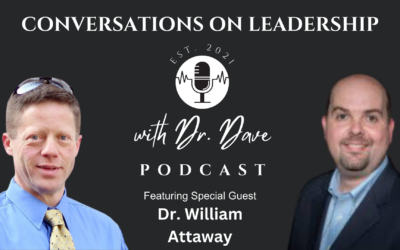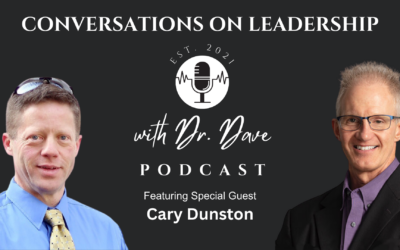Transcript
John J. Fenton: Great, Dave. Thank you so much. It’s a pleasure to be with you today. A little about me: I work with CEOs and managing partners who love running and growing their businesses and leading their teams but hate all the stress that comes with it. My background is in executive mentorship and leadership mentorship. I spent over 30 years in public accounting, where I was a managing partner with one of the top five or six firms in the world. I helped transform our business and grow it dramatically in the early 2000s.
I was also a collegiate athlete and played college football for the University of Miami, which taught me a lot about teams and successful teamwork. Throughout my career, I’ve always been a student of leadership, focusing on what makes a good team and a good leader. Now, I work with my clients and their teams to help them be the best leaders they can be and transform their businesses positively.
Dr. Dave Miles: Nice. I knew you played collegiate football, and it was impressive to hear more about that. You spent a lot of time at BDO as a managing partner. How long were you there?
John J. Fenton: I was at the firm for 31 years. I took early retirement a few years ago to follow my passion. I wanted to help my clients and business leaders in a different way than I could in a traditional CPA firm. So, I embarked on a new path, working with CEOs, C-suite executives, and managing partners to navigate the rapid changes in today’s business environment. I always keep my ear to the ground for new trends and ways of thinking, aiming to think differently and achieve more.
Dr. Dave Miles: That’s one reason I asked you to be on this initial episode of “Conversations on Leadership.” You have a unique perspective from both being a managing partner and now helping leaders in a different capacity. It’s not theoretical; it’s based on real experience.
John J. Fenton: Exactly. What I teach and how I guide my clients are based on practical experience from being in the trenches and dealing with issues day to day. Someone recently told me they value my background as a managing partner because it means I understand what’s going on. Some executive mentors don’t have that experience and might come from a more theoretical or academic background. I incorporate my experience, along with my background as a black belt in Tai Chi and a master of meditation, to teach my clients ways to achieve clarity amidst chaos.
Dr. Dave Miles: That’s great. Let’s start with our first question: What does leadership mean to you, and what does good leadership look like?
John J. Fenton: I love this quote from Stephen Covey: “Leadership is affirming people’s worth and potential so clearly that they are inspired to see it in themselves.” The best coaches and mentors I’ve had saw potential in me and helped me grow. Good leaders need to be coaches themselves, recognizing the talent in their teams and adapting strategies to put them in the best positions to succeed. Don Shula, the former Dolphins coach, was great at this—he adapted his strategies to the talent on his team, and that’s a valuable lesson for business leaders.
Dr. Dave Miles: I like that. Adapting strategies to the talent you already have, especially high performers, is crucial. Sometimes it’s about aligning them in the right positions to leverage their strengths.
John J. Fenton: Absolutely. For example, I had a client with an underperforming general manager. After a difficult conversation, they realized the GM had great talents in a different area of the business. By moving him to a role where he excelled and promoting someone else to GM, it was a win-win for everyone. I believe in leveraging strengths and unique abilities. Knowing your people’s unique abilities and putting them in the right positions can transform your organization.
Dr. Dave Miles: That’s a powerful example. Knowing your direct reports deeply and understanding their strengths and weaknesses can help customize communication and team dynamics.
John J. Fenton: Exactly. It’s about being aware and understanding your team. One of the big mistakes leaders make is assuming they know what’s happening or why someone is acting a certain way. You have to ask good questions and listen intently. Leadership is all about relationships.
Dr. Dave Miles: Absolutely. Let’s take a break and continue this conversation in a moment.
Dr. Dave Miles: We’re back with John Fenton, the CEO Sensei. My next question is, what is one of the biggest leadership challenges you have faced?
John J. Fenton: One of the biggest challenges I faced was around health. I was managing and growing the business, working long hours, and carrying the weight of the firm on my shoulders. I went to the doctor for a stress test and found out I had an irregular heartbeat. Fast forward to about three years ago, I passed out during a meeting with a client. They had to administer CPR and use a defibrillator on me multiple times. I was rushed to the hospital and put into a hypothermic coma. I woke up in the ICU with my wife and daughter by my side.
I realized then that I had put my health last on my to-do list. I had to make my health my number one priority and focus on breathing, rest, and not trying to control everything. It’s crucial for leaders to take care of their health, as stress affects everyone differently.
Dr. Dave Miles: That’s a powerful story. What advice would you give to leaders with a similar driven, type A personality on how to let go and prioritize their health?
John J. Fenton: Control what you can control—your response to stress. The simplest way to manage stress is through your breathing. Focus on breathing in through your nose and exhaling through your mouth. This helps stimulate the parasympathetic nervous system, which calms you down. Taking deep breaths can help reset your perspective and allow you to react more positively to stressful situations.
Dr. Dave Miles: That’s great advice. We were just discussing emotional intelligence and how awareness and deliberate breathing can help manage stress responses. Being aware of your triggers and taking a moment to breathe can make a big difference.
John J. Fenton: Absolutely. The Navy SEALs use a technique called box breathing to manage stress in high-pressure situations. It’s about slowing down and being mindful of your breath. This can help you reset and handle stress more effectively.
Dr. Dave Miles: Let’s take a break and continue our discussion in a moment.
Dr. Dave Miles: We’re back with John Fenton, the CEO Sensei, for our final segment. What do you see as one of the biggest mistakes leaders make today?
John J. Fenton: Leaders often make assumptions, what I call the Assumption Trap. They assume they know why someone is acting a certain way or why a customer is behaving differently. You have to ask questions and listen intently to understand what’s really going on. Another mistake is thinking that being vulnerable is a sign of weakness. In reality, it shows strength and fosters an environment where everyone can be open, leading to better decision-making.
Leaders also often feel like they need to know everything or fall into impostor syndrome. It’s important to acknowledge that you don’t know everything and to find people who do. Authenticity is key—be yourself and don’t try to be someone you’re not. Lastly, leaders need to prioritize their health, as nothing else matters without it.
Dr. Dave Miles: Those are great points. Making assumptions can lead to miscommunication and stress. Assuming positive intent and having open conversations can prevent a lot of misunderstandings.
John J. Fenton: Exactly. Assume positive intent and have the conversation. Listening and asking good questions are crucial. Also, create a culture where it’s okay to make mistakes. This encourages innovation and learning. Continuous feedback loops from customers and employees can provide valuable insights and help improve the organization.
Dr. Dave Miles: What is the best way for leaders to improve their leadership skills?
John J. Fenton: Enhance your awareness and be visible. Talk to your people and create an environment where it’s okay to make mistakes. Everything starts with you as the leader, so set the tone and model the behavior you want to see. Engage with your high performers and ensure they feel valued and supported. Continuous feedback and clear communication are key to retaining top talent.
Dr. Dave Miles: How can people get in touch with you and stay connected?
John J. Fenton: You can get my book, “Five Minute Mastery,” on Amazon. I also have a companion guide for CEOs and managing partners, available on my website, JohnJFenton.com. You can also connect with me on LinkedIn. I encourage you to reach out for a free consultation or to discuss any challenges you might be facing.
Dr. Dave Miles: Thank you so much for being on the show, John. That wraps up “Conversations on Leadership with Dr. Dave.” We will see you next time.
Our special guest for Episode 1 of the Conversations on Leadership with Dr. Dave podcast is John J Fenton, the CEO Sensei.
Previously a principal in a “Big 4” accounting firm, John is now a Certified Success Principles Trainer, award-winning speaker, coach/mentor, best-selling author, and leading authority in Leadership Mastery.℠
As an executive coach, he works with CEOs and business leaders who want more clarity, better results, and more freedom, elevating their clarity, calmness, and confidence in any crisis.
Listen to his incredible story of how he survived cardiac arrest to bring a renewed focus on his health, his priorities, and how that new perspective can help YOU in the world of business.
You can find out more about him at www.JohnJFenton.com



